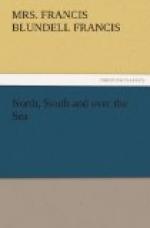She was clasping the new-comer’s hands now, and shaking them excitedly up and down, her eyes searching his face the while.
“How is my lad?” she repeated. “He mun be a gradely mon now—a gradely mon! Tis what he said hisself when he wur breeched. Dear o’ me, I mind it well. He come runnin’ in so proud wi’s hands in’s pockets. ’I’m a gradely mon now,’ he says, ‘same’s my feyther.’”
She dropped his hands and wiped her eyes.
“My word, mother,” said Mrs. Whiteside reprovingly, “how ye do run on! Was my brother well, mester, when ye see him last?”
“Quite well,” responded the stranger gruffly. “Well and hearty.”
“Thank God for that!” cried the old woman.
“He told me,” went on the other, and his voice still sounded rough and harsh from behind his great beard; “he told me if I were anywhere in Lancashire to look up the old place, and tell his folks he was alive and well.”
“Has he been doin’ pretty well, sir, d’ye know?” inquired the younger woman, politely, but with interest.
“Pretty well—lately; so I’ve been told,” returned he.
“And he didn’t send nothin’ to his mother? Nothin’ besides the message?” she went on. “Well, I call it a sin and a shame; ’twas scarce worth your while to seek us out for that.”
“Howd thy din, Mary,” cried Mrs. Rigby angrily. “Not worth while! Why, I’ll bless the gentleman for it, an’ pray for him day an’ neet while I live. Wick an’ hearty. My lad’s wick an’ hearty,—an’ I was afeared he wur dead. An’ he took thought on his owd mother so fur away, an’ sent her word, bless him!”
“He might ha’ sent ye somethin’ else I think,” said Mary wrathfully; “I don’t hold wi’ makin’ such a to-do about a chap as never did nothin’ for you in his life. There’s others as is worth more nor him.”
The old woman drew herself up, her eyes blazing in their sunken orbits.
“Mary,” she said, “if ye mean to cast up as ye’re keepin’ me in my owd age, I tell ye plain, though there are strangers here, I think no shame on’t. I brought ye into the world, an’ I reared you an’ worked hard for you till ye was up-grown, an’ kept a whoam o’er your head wi’ nought but the labour o’ my two hands. An’ now as I’m stricken in years an’ the owd place is gone, I think no shame o’ being’ behowden to ye for mate an’ shelter.”
“La, mother,” stammered Mary “whatever makes ye go for to say such things?—I’m sure I wasn’t castin’ up—”
“Ye’ve no need to cast up,” interrupted her mother fiercely. “I’m not behowden to ye for mich, as how ’tis—I reckon I addle my mate.”
The man turned upon the younger woman with a savage glance, but she was too much absorbed in her own grievance to heed him. “I wasn’t castin’ up, mother,” she asseverated. “I nobbut meant it seemed a bit hard as you should think as much of Will as of me.”




